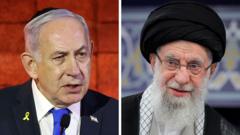Israel's recent intensified strikes on Iran not only target military capabilities but also aim at the very leadership responsible for Tehran's aggressive posture. This calculated escalation raises questions about the potential for Iranian retaliation and its implications for ongoing nuclear negotiations.
Israel's Bold Offensive: Targeting Iran at a Critical Juncture

Israel's Bold Offensive: Targeting Iran at a Critical Juncture
Unprecedented military action marks a strategic shift in Israel's approach to Iran, with implications for regional stability.
Israel's recent military operations against Iran have entered a new and unprecedented phase, exhibiting a level of intensity and scope that surpasses previous assaults conducted last year. Significantly, this offensive has adopted strategic tactics reminiscent of the Israeli military’s aggressive maneuvers against Hezbollah in Lebanon the previous November. The focus has not merely been on crippling Iran’s missile infrastructure but also on executing precision strikes against pivotal figures within Iran's leadership.
Video evidence from Tehran shows targeted buildings being hit, drawing ominous parallels to Israel's targeted operations in the Beirut suburbs that culminated in the assassination of Hezbollah's leader, Hassan Nasrallah. However, unlike last year's operations, no equivalent high-profile figures—such as Iran's Supreme Leader Ali Khamenei—appear to have been directly targeted. Yet, the reported elimination of key Iranian military officials, including Hossein Salami, the commander of the Revolutionary Guards, and several nuclear scientists, exemplifies the significant damage inflicted on Iran's elite early in the operation.
Moreover, Israeli Prime Minister Benjamin Netanyahu has indicated that this campaign is poised to persist over the coming days, potentially inviting a more formidable and reactive response from Iran than what was observed during its two retaliatory strikes against Israel last year. Conversely, the severity of Israel’s actions may complicate Iran's ability to muster an effective response, aligning with Netanyahu’s strategic calculations.
The rationale for launching this operation at this particular moment is multifaceted. Netanyahu has consistently warned that Iran’s nuclear ambitions represent an existential threat to Israel, reinforcing the urgency of intervention. Recent statements from Israeli military officials have suggested that Iran possesses sufficient materials to produce up to 15 nuclear warheads within mere days, elevating the stakes in the already tense regional dynamics.
Additionally, the timing coincides with delicate negotiations between the United States and Iran regarding a nuclear deal, which are set to enter their sixth round. With conflicting reports about progress in these discussions, Netanyahu’s decision to proceed with military action may have been an attempt to disrupt any imminent agreement he deems unacceptable.
In military assessments, Israeli officials might have concluded that both Iran and its regional allies, particularly Hezbollah, have been sufficiently weakened to mitigate the threats they previously posed. Ultimately, only time will reveal whether this offensive is a decisive strategic victory for Israel or a perilous miscalculation that could escalate tensions in the region.





















